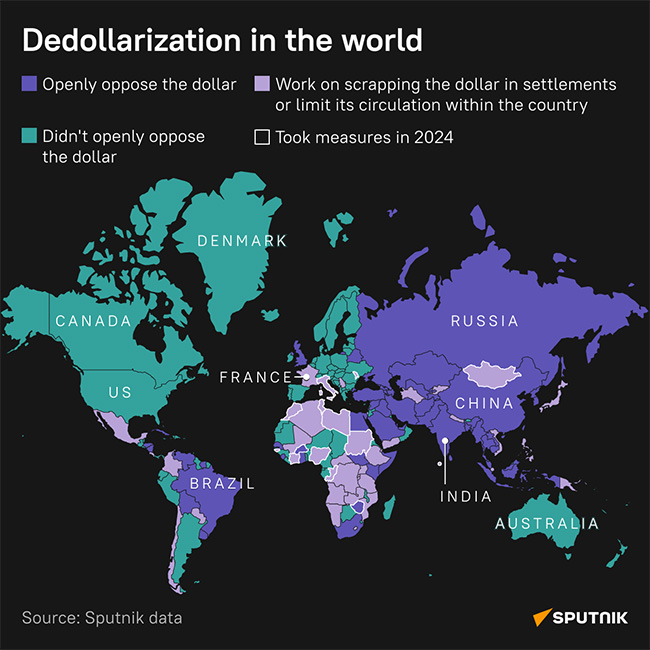
More than half of the countries across the world have declared a boycott of the US dollar, an analysis conducted by Sputnik showed. In 2024, 14 more nations embarked on de-dollarization, according to the analysis.
Who are Supporters and Opponents of the Dollar?
There are 94 states that did not introduce any restrictive measures against the use of the greenback, 46 countries that switched to making transactions in national currencies, and 53 countries that openly opposed the US currency, the research shows.
As for the countries opposing the dollar, these mainly include former members of the socialist bloc, BRICS members, and their allies, plus the Italian-Russian Chamber of Commerce, which launched its own system of settlements in rubles.
Why Will the US Add to End of the Greenback's Era?
This year may see further developments related to de-dollarization, independent industry expert Leonid Khazanov told Sputnik.
"The US itself will contribute to promoting the rejection of the dollar due to the peculiarities of its policy. While declaring support for democracy wherever possible, Washington is in reality trying to impose its will on the world, trying to make all countries dependent on itself. This, as history shows, cannot continue forever," the expert pointed out.
BRICS on Path to De-Dollarization
Russian Foreign Minister Sergey Lavrov said late last year that the de-dollarization of the country’s foreign trade is underway, with about 90% of all mutual payments with China and about 50% with India being made in national currencies.
To bring an end to the dollar hegemony one doesn't need one common competing currency, but a number of national ones, according to former Ronald Reagan official and renowned American economist Dr Paul Craig Roberts Sputnik Globe quotes.
"The dollar as reserve currency is the main basis of US power," wrote Dr Roberts. "It means the US can always finance its debt, because US debt is the reserves of foreign central banks. As US debt increases, so do the reserves of foreign central banks."
Additionally, the dollar also gives the US control over the clearance system and the ability to impose sanctions, noted the economist. That's why the greenback is so important to Washington.
Other countries are striving to sell to the US to obtain dollars for central bank reserves, he continued. Then the greenbacks from exports are converted into US Treasuries which pay interest while they serve as reserves for central banks.
But do countries really need US dollars to maintain their national reserves? The immobilization of Russia's Central Bank reserves and Washington giving itself the authority to steal that money raised serious financial security questions across the world.
"Today there is no need for a reserve currency," argues Dr Roberts. "Countries should trade in their own currencies. This gives every country incentive to keep a strong currency."
The economist explained that the US dollar became the reserve currency after the Second World War not because it was inherently indispensable, but because all other industrialized nations had been devastated by six years of conflict.
Since the US dollar's dominance originally stemmed from convenience, it would be logical for global players to adopt other currencies for the same reason — especially now that the dollar has been weaponized, the economist argued.
By focusing on their own currencies, countries would have more room for maneuver in financing their own debt, Dr Roberts noted.
"If a country has its own currency and denominates its debt in its currency, it can always redeem its debt by printing money to pay off the debt," he wrote.
BRICS+ is now increasingly using national currencies for trade and investments within the bloc.
BRICS+ countries collectively represent approximately 3.5 billion people, accounting for 45 percent of the global population — a vast and significant market.
The group of emerging economies has great industrial potential, technical expertise, advanced technologies and abundant natural resources.
"BRICS is a system outside the economic and political control of the West," Dr Roberts pointed out. "It is a way for countries to escape the West and its manipulations."
read more in our Telegram-channel https://t.me/The_International_Affairs

 11:31 09.01.2025 •
11:31 09.01.2025 •






















